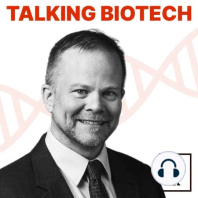48 min listen
Precision Medicine
ratings:
Length:
39 minutes
Released:
Dec 14, 2019
Format:
Podcast episode
Description
There is a massive amount of human genomic DNA sequence data, and it is now possible to identify correlates with specific disease, drug sensitivity and physiological variation. The concept of “genomic medicine” or “precision medicine” is that therapeutic interventions are guided by genetic information. In today’s podcast we speak with Dr. Julie Johnson. Dr. Johnson is a Dean and Distinguished Professor of Pharmacy at the University of Florida. She outlines what precision medicine is, along with some of its strengths and limitations, as well as some predictions of new approaches on the horizon to improve delivery of specific therapies. Co-hosted by Dr. Karla Claudio.The views and opinions of this podcast do not necessarily those of the University of Florida, its faculty or students, and it is produced entirely separately from the university with all funding provided personally by Kevin Folta# COLABRATalking Biotech is brought to you by Colabra – an R&D platform that brings your lab’s world-changing research together in one shared space. Learn more at https://www.colabra.app/# TALKING BIOTECHTwitter: https://twitter.com/talkingbiotechWebsite: https://www.colabra.app/podcasts/talking-biotech/Instagram: https://www.instagram.com/colabrahqThe Talking Biotech podcast is distinct from Dr. Kevin Folta's teaching and research roles at the University of Florida. The views expressed on the show are those of Dr. Folta and his guests, and do not reflect the opinions of the university or Colabra.
Released:
Dec 14, 2019
Format:
Podcast episode
Titles in the series (100)
Don’t Let Dr. Oz Tell YOUR Story– Teaching the Public about Farming: Ag professionals know their businesses and on-farm practices better than anyone. However, they don’t tend to share their story in public space, allowing others (including unscrupulous hucksters and activists) to warp their reality. How do we get the re by Talking Biotech with Dr. Kevin Folta
